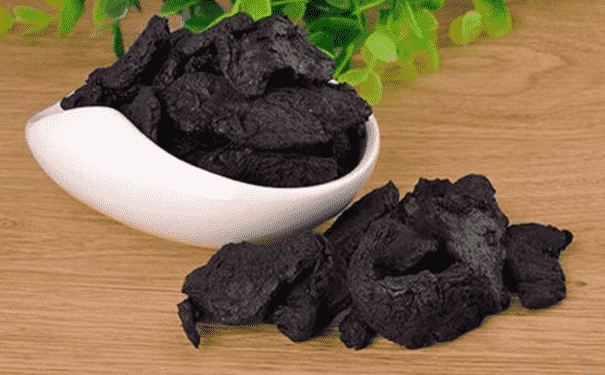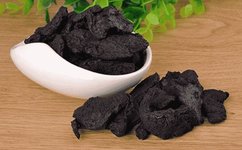Shudi Huang (熟地黄) is a traditional Chinese medicinal herb derived from Sheng Di Huang (生地黄). It has high medicinal value, helping to nourish yin and replenish blood, and can improve symptoms such as soreness in the lower back and knees, and irregular menstruation. Do you know the nutritional value of Shudi Huang? What are its benefits and effects? Today, we will discuss the nutritional value and effects of Shudi Huang, so let’s take a look.

1. Nutritional Value of Shudi Huang
Shudi Huang contains mannitol, β-sitosterol, zizyphus saponins, soy saponins, rehmannin, alkaloids, fatty acids, glucose, sucrose, arginine, γ-aminobutyric acid, vitamin A, iron, and other components.
2. Effects and Functions of Shudi Huang
Nature and flavor: Sweet, slightly warm. Channels: Liver and Kidney.
Main functions: Nourishes yin, replenishes blood, benefits essence, and fills marrow. It is used for liver and kidney yin deficiency, soreness in the lower back and knees, bone steaming and tidal fever, night sweats and nocturnal emissions, internal heat and thirst, blood deficiency and sallow complexion, palpitations and anxiety, irregular menstruation, excessive bleeding, dizziness, tinnitus, and premature graying of hair.
Sheng Di Huang is processed with yellow wine and steamed until it turns black and oily, or directly steamed until it becomes black and glossy.
This herb can protect cardiovascular and cerebrovascular health, enhance immune function, provide antioxidant effects, and inhibit thrombosis.
3. Recipes Using Shudi Huang
◆ Shudi Huang Braised Beef: 15 grams of Shudi Huang is placed in a clay pot with 300 milliliters of water and simmered for 20 minutes to extract the juice. Cut 500 grams of beef into 4 cm cubes, briefly boil in water, and then remove. When the oil is heated to 60% hot, add ginger, garlic, and cumin to release their fragrance, then add the beef and stir-fry slightly. Add cooking wine, sugar, soy sauce, and salt, stir-frying until the beef is colored and fragrant, then add the medicinal juice, bring to a boil, and simmer until the beef is tender and the juice is reduced. This dish takes advantage of its yin-nourishing and blood-replenishing properties, suitable for patients with neurasthenia and anemia.
◆ Shudi Huang Dog Meat Soup: 30 grams each of Shudi Huang and Fu Pian, 10 grams of Chen Pi, and an appropriate amount of Sichuan peppercorns are placed in a seasoning bag. Cut 1000 grams of dog meat into large pieces, wash in clean water to remove blood, and blanch in boiling water for 10 minutes. In a clay pot, place some pork ribs, add the dog meat, seasoning bag, green onion, and ginger, and add enough water to boil. Then simmer until the meat is tender, remove the green onion, ginger, and seasoning bag, cut the meat into strips, and return to the pot, adding pepper, MSG, and salt to finish. This dish takes advantage of its warming and tonifying properties for the spleen and kidneys, suitable for chronic gastroenteritis, colitis, chronic prostatitis, prostate enlargement, and elderly weakness.
◆ Eight Treasure Chicken Soup: 7.5 grams of Shudi Huang, 5 grams of Dang Shen, 5 grams of Fu Ling, 5 grams of Bai Zhu, 2.5 grams of Zhi Gan Cao, 5 grams of Bai Shao, 7.5 grams of Dang Gui, and 3 grams of Chuan Xiong are placed in a cloth bag. Clean one hen, and crush 750 grams of pork and 750 grams of pork bones. Place the chicken, pork, pork bones, and the medicine bag in a pot, add enough water to boil, skim off the foam, add green onion, ginger, and cooking wine, and simmer until tender. Remove the green onion, ginger, and medicine bag, cut the chicken and pork into pieces, and return to the pot, adding salt and MSG to finish. This dish takes advantage of its qi and blood tonifying properties, suitable for qi and blood deficiency, sallow complexion, poor appetite, and fatigue.
4. Dosage of Shudi Huang
Daily dosage is 12-30 grams. Decoction for oral administration.
5. Contraindications of Shudi Huang
Shudi Huang has a sticky nature that can hinder digestion. It is contraindicated for those with spleen and stomach deficiency, qi stagnation with phlegm, abdominal distension, and loose stools. Additionally, during consumption, avoid eating radishes, green onions, leeks, and garlic chives.
6. Difference Between Shudi Huang and Huang Jing
Jiu Huang Jing is processed Huang Jing that has been prepared with yellow wine, which is effective for promoting qi and nourishing yin. Shudi Huang is processed with honey, making it moist and sweet, with effects of nourishing blood and tonifying yin, filling essence and marrow. Thus, the preparation methods and effects of Jiu Huang Jing and Shudi Huang differ.
Jiu Huang Jing, also known as Zhi Huang Jing, has its mucilage destroyed and removed, enhancing its nourishing effects while also promoting circulation. It is suitable for symptoms such as soreness in the lower back and knees, premature graying of hair, weakness, dizziness, tinnitus, and dim vision. Jiu Huang Jing is made by stewing or steaming Huang Jing with wine. Its effects are comprehensive and beneficial, providing antioxidant and anti-fatigue benefits.
Shudi Huang, on the other hand, is the tuber of the Rehmannia glutinosa plant, also known as Shudi Huang or Fu Di, processed through steaming and drying. It is typically steamed repeatedly with wine, sand, and Chen Pi until it turns black and oily, with a soft and sticky texture. It can be sliced or charred for use. Shudi Huang is a high-quality medicinal herb with blood-nourishing and yin-tonifying effects, suitable for blood deficiency, dizziness, palpitations, insomnia, irregular menstruation, and excessive bleeding, as well as for symptoms of kidney yin deficiency such as tidal fever, night sweats, nocturnal emissions, and thirst. It is one of the main ingredients in the non-prescription herbal formula Liu Wei Di Huang Wan.
7. Shudi Huang Porridge
Ingredients:
Sheng Di Huang (fresh Rehmannia, doubled) 15g, white rice 1 cup, water 8-10 cups.
Instructions:
1. Slice Sheng Di Huang, rinse slightly, place in a pot, add 2-3 cups of water, and simmer on low heat for about 20 minutes to extract the juice.
2. Wash the white rice and place it in a pot, adding the remaining water to soak for about 30 minutes.
3. Pour in the filtered medicinal juice, stir, and bring to a boil over high heat.
4. Reduce to low heat, cover the pot, and simmer until it becomes porridge.

